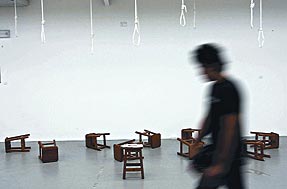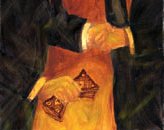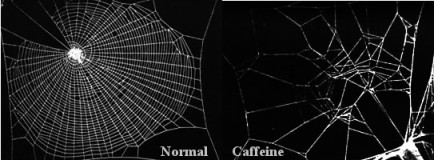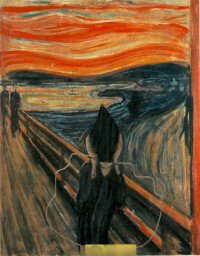Mysterious disappearance of Nguyen Tuong Van artwork: The limits of Google and Yahoo
 Remember the news item last Friday about the controversial installation artwork "I am going to send you to a better place" by Slovenian artist Matija Milkovic Biloslav? That political artwork about Nguyen Tuong Van? No? I don't blame you. Suddenly the news networks (except ABC) shut up about it either because of the legal threat from the directors of the Lasalle-SIA college or because the college rapidly destroyed evidence of the poltical nature of the work and then denied any political connection that would allow the story to survive. More disturbingly, it seemed to disappear off the net too! It's okay though, I eventually found it.
Remember the news item last Friday about the controversial installation artwork "I am going to send you to a better place" by Slovenian artist Matija Milkovic Biloslav? That political artwork about Nguyen Tuong Van? No? I don't blame you. Suddenly the news networks (except ABC) shut up about it either because of the legal threat from the directors of the Lasalle-SIA college or because the college rapidly destroyed evidence of the poltical nature of the work and then denied any political connection that would allow the story to survive. More disturbingly, it seemed to disappear off the net too! It's okay though, I eventually found it.But, back to the start of the story... According to the threatened newspaper itself:
Slovenian art student Matija Milkovic Biloslav had displayed under falling nooses a single standing stool carrying a card with Van's execution number – C856 – a very deliberate reference to the Melbourne man, scheduled to be hanged at dawn this Friday. But after The Australian unexpectantly attended last Friday night's opening of the exhibition at the Lasalle-SIA College of the Arts, the self-consorship that pervades the country of four million took hold.News.com.au, however, did publish a photo of the artwork, as did SMH in a
Over the weekend, The Australian newspaper was threatened with legal action by Lasalle directors if it published a picture of the work and all requests for an interview with the artist were denied. The card carrying Van's execution number was hastily removed. The college, which receives government funding, said the artwork was about suicide.
related news item. I don't suppose anyone is really surprised about this: "Singapore college stifles political debate through art" is perhaps not an earth-shattering headline and so that's why we didn't hear any more about it.
But why did all the images of the artwork and links to the news articles disappear off of Google and Yahoo, arguably the two top search engines? It was only when I switched to MSN search that I was able to find the articles again (a good one on About.com too). We know that in the past, Google
has already been complicit with the Chinese government to block questionable content containing words like "dem*cracy" and "tian*nmen square". I wonder what other agreements Google is now making with other anti-free-speech governments?
Of course I'm being overly paranoid here. I don't think Google has made an agreement with Singapore. We are probably just seeing the evidence of tardy indexing of non-US websites and the limits of the effectiveness of its page-ranking algorithm. I do think it is worth getting concerned about our reliance on US-oriented and public-company-based tools to navigate and disseminate the web. It is not only tricky to find highly-specific information about very current Australian events via the dominant three search engines, but especially difficult if it's politically sensitive to the point that governments wish to prevent its spread.
Perhaps it is time to stop assuming Google can serve all of us all the time. Search engine indexing and algorithms ought to be really tailored to the geopolitical needs of the user. A specific search engine apparently already was created to assist the needs of Chinese users to access information blocked by Google to Chinese IPs (Elgoog) but it still relied on the US-centred indexing and searching algorithm of Google. Time, I say, to prototype a not-for-profit search engine that would provide Country-X-centred indexing and searching; and one of these for any country or cultural group that would care to make it.
For example, Australian users typically want to find current information produced by Australians or people who are interested in Australia, not US-produced information. So a high priority would be to index Australian websites or content produced by Australians. The page-ranking would work better for Australian users if links from high-ranking Australian websites were worth more than high-ranking US websites. In fact, links would be accorded a score on the basis of how near or far they are geopolitically (or perhaps just geographically) from Australia.
Any thoughts? Anyone interested in picking up the baton?
Addendum: Voctir, a Singaporean blogger, has posted photos of Biloslav's artwork in it's original state.
Main reference: ABC News radio broadcast about the C856 artwork story
Technorati Tags: Nguyen Tuong Van, censorship, political art, search engine, page rank, Matija Milkovic Biloslav, Singapore politics
 Further to the Michelle Leslie story, Crikey today published an "
Further to the Michelle Leslie story, Crikey today published an "






 Whether it was done knowingly or not is a point of contention, but regardless I feel a bit shocked. It was easy, in those first four years, to be spending a few hours of my day helping the wheat to grow up tall and harvest it to be sold to the AWB, blissfully unaware of how my tiny actions could be related to such corruption on the other side of the globe!
Whether it was done knowingly or not is a point of contention, but regardless I feel a bit shocked. It was easy, in those first four years, to be spending a few hours of my day helping the wheat to grow up tall and harvest it to be sold to the AWB, blissfully unaware of how my tiny actions could be related to such corruption on the other side of the globe! With reference to
With reference to  Notably, many people have taken the opposite tack and used the word terrorist to name these other instances of violence and killing I mentioned. But the term ends up sounding inappropriate and seems to backfire on the groups, making them appear too radical and too fringe to be worth listening to.
Notably, many people have taken the opposite tack and used the word terrorist to name these other instances of violence and killing I mentioned. But the term ends up sounding inappropriate and seems to backfire on the groups, making them appear too radical and too fringe to be worth listening to.




